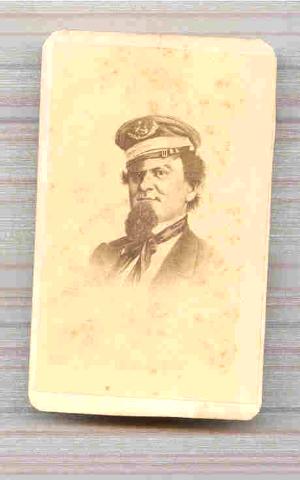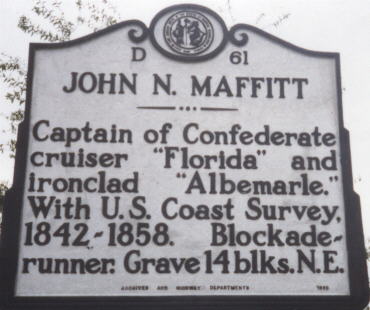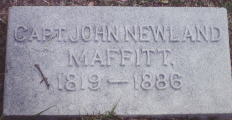Confederate States Navy Research Library, Mobile, Alabama, www.csnavy.org
Capt. John Newland Maffitt (1819-1886)
Born at sea in the Atlantic Ocean. Died in Wilmington, North Carolina.
CSNCSNCSNCSNCSNCSNCSNCSNCSNCSNCSNCSNCSNCSN CSNCSNCSNCSNCSNCSNCSNCSNCSNCSNCSNCSNCSNCSN
CSNCSNCSNCSNCSNCSNCSNCSNCSNCSNCSNCSNCSNCSN
 Photo courtesy Bill Chisolm
of FL
*
Oakdale Cemetery, Wilmington, North Carolina
Photo courtesy Bill Chisolm
of FL
*
Oakdale Cemetery, Wilmington, North Carolina

 Photos courtesy Robert J. Cooke
of NC
JOHN N. MAFFITT
by James Sprunt of NC (family friend)
2 August 1896 (SHSP)
Among that devoted band of United States navy officers
whose home and kindred were in the South at the outbreak of the war, and
who resigned their commissions rather than aid in subjugating their native
State, there were none braver nor truer than our own Captain John
N. Maffitt, who, yielding to necessity, severed the strong ties
of a service under the old flag in which he had long distinguished himself,
and relinquished not only a conspicuous position directly in the line of
speedy promotion to the rank of admiral, but sacrificed at the same time
his entire fortune, which was invested in the North, and which was confiscated
shortly afterward by the Federal Government.
Photos courtesy Robert J. Cooke
of NC
JOHN N. MAFFITT
by James Sprunt of NC (family friend)
2 August 1896 (SHSP)
Among that devoted band of United States navy officers
whose home and kindred were in the South at the outbreak of the war, and
who resigned their commissions rather than aid in subjugating their native
State, there were none braver nor truer than our own Captain John
N. Maffitt, who, yielding to necessity, severed the strong ties
of a service under the old flag in which he had long distinguished himself,
and relinquished not only a conspicuous position directly in the line of
speedy promotion to the rank of admiral, but sacrificed at the same time
his entire fortune, which was invested in the North, and which was confiscated
shortly afterward by the Federal Government.
The biography of this modest hero has never been
written. I give the following brief sketch prepared by the accomplished
Mrs. J. N. Maffitt, at the time of her distinguished husband's decease,
who is now writing a more extended memoir of his career.
(published in 1906 by Neale, 'The Life and Services
of John Newland Maffitt')
John Newland Maffitt was born at sea on
the 22d of February, 1819 His parents were Rev. John Newland Maffitt and
Ann Carnicke, his wife. Rev. Mr. Maffitt, having determined to emigrate
to America, left Ireland with his wife and family late in January or early
in February, and landed in New York on the 21st of April, 1819, his son
having been born on the passage. Their first home was in Connecticut. When
John was about five years old, his uncle, Dr. William Maffitt, who had
accompanied them to America, visited his brother, Rev. Mr. Maffitt, and
finding him in straitened circumstances, begged to adopt their son, and
on the consent of his parents, Dr. Maffitt brought his nephew to Fayetteville,
N. C. Some years were passed in this happy home of his boyhood, when
his uncle determined to send him to school at White Plains, N. Y. As a
little stripling, he started by the old-time stage coach, with his ticket
tacked to his jacket, and on his arrival much curiosity was shown to see
the little boy who had come alone from his distant southern home. He remained
at this school, under Professor Swinburn, until he was thirteen years
old, when his father's friends obtained for him a commission as midshipman
in the United States Navy.
His first orders were to the St. Louis, then at
Pensacola Navy-Yard. His second sea orders were to the Constitution,
the flagship of the squadron, commanded by Commodore Elliott, then fitting
out for the Mediterranean. This cruise lasted three years and six
months, and it was during that time that most of the incidents related
in the Nautilers took place. Having been appointed aide to Commodore Elliott,
the young midshipman had many advantages not otherwise obtainable. He was
next ordered to the frigate Macedonian as past midshipman, and it was while
in port at Pensacola, Fla., that he had his first experience of
"yellow jack," and came near losing his life. His first independent command
was the Gallatin. He commanded also the brig Dolphin and several others.
He was engaged, under Professor Bache, for some years on the coast
survey, and was of great service to the professor, which the latter was
not slow to acknowledge. Much of their work was in the harbors of Nantucket,
Charleston, Wilmington, and Savannah. A
channel in the harbor of Charleston still bears his name.
In one of the numerous published sketches this tribute is paid to him:
A SPLENDID OFFICER
"He was always considered one of the best officers
and most high-toned gentlemen of the old service. For some years he was
connected with the coast survey, and Professor Bache, the head of the department,
declared that if Maffitt was taken from him he could not supply his place
in all the navy." He added: "He is
not only a thorough seaman and game to the backbone, but a man of superior
intellect, a humorist of rare excellence, and one of the most delightful
companions. There is no position in his profession which Maffitt is not
capable of filling with honor and distinction." This
was his acknowledged position when the war began. His last command while
in the service of the United States, was the Crusader. He was very successful
in capturing slavers. In January, 1860, while in command of the Crusader,
and also acting as paymaster of the vessel, he was ordered by the Secretary
of the Navy to proceed to Mobile, and there cash a check on the
collector of the port for prize money due the officers and crew. The city
being agitated at the time by the Ordinance of Secession, just passed by
the State of Alabama, he was forced to put his vessel in a defensive position,
and soon retired to the port of Habana. Here, failing to negotiate
with the bank of Habana for the funds requisite for the necessities
of the vessel, he advanced from his private funds the money needed to work
the steamer to New York, where he was ordered. He turned the steamer over
to the proper authorities and went to Washington to settle his accounts.
His cash accounts received no attention, though for several months he was
a constant applicant for settlement. A trying position was his, as his
wife was dead, and his children had no kinsfolk, save in North Carolina;
if he remained in the navy his property, which was all in the North, would
be secured to him. All that appealed to his interests lay there. Love
of his profession was entwined with every fibre of his being. On the
other hand, he would have been compelled to fight against his people---perhaps
fire upon the very home that had sheltered him, and was then sheltering
his defenceless children. One night a friend informed him that his name
was down for arrest the next day. His affections drew him South. His resignation
having been accepted, he felt free to leave and cast his fortunes with
his people.
His war record is well known.
During the earlier part of the war he commanded
the celebrated Confederate corvette Florida, and the
ram Albemarle, rendering most valuable service to the Confederacy.
Afterwards he was in command of the blockade-runners Lillian,
Owl, and other vessels engaged in bringing supplies and munitions
of war for the South. At the close of the war, his property confiscated
and he an exile, he applied for a command in the English merchant service,
and was given the command of a fine steamer, running between Liverpool
and Rio Janeiro. She was subsequently sold to the Brazilian Government
and used as an army transport. While conveying several hundred soldiers
to the scene of action, small-pox broke out among them, and as the well
refused to nurse the sick, or bury the dead, those duties devolved upon
Captain Maffitt, and a fearful time he had--" sickening to the last
degree," he described it--and the soldiers were mutinous and without discipline.
He retained command of this steamer for eighteen months, when, at the urgent
entreaty of his family, he resigned the command and came home. He soon
after purchased a small farm near Wilmington, where he resided for nearly
eighteen years. In July, 1885, he moved to Wilmington. For a year
or two his health had been failing, but he determined to make a brave effort
to retrieve his fortunes and provide for his young family. The disappointment
of that hope was too great a shock for his feeble frame; the thought that
he could no longer provide for his loved ones broke his heart. After
an illness of more than three months, he died on the 15th of May, 1886,
in the sixty-eighth year of his age.
MUCH MORE TO COME, please check back.
Return
to the Confederate States Navy HOME PAGE
 CSNCSNCSNCSNCSNCSNCSNCSNCSNCSNCSNCSNCSNCSN
CSNCSNCSNCSNCSNCSNCSNCSNCSNCSNCSNCSNCSNCSN CSNCSNCSNCSNCSNCSNCSNCSNCSNCSNCSNCSNCSNCSN
CSNCSNCSNCSNCSNCSNCSNCSNCSNCSNCSNCSNCSNCSN

